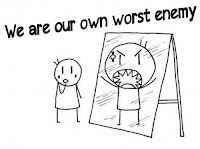Jealousy - excruciatingly uncomfortable!
At its most mild jealousy is considered an instinctual reaction that makes us want to protect what we feel is ours. Unlike simply being protective though, jealous feelings can balloon quickly into destructive behavior and cause us to act in ways that are selfish and controlling. It can even cause us to assume things are happening that are not, like seeing a friendly exchange as the sign of an affair, or working late as hiding a secret addiction.
Psychologists believe jealousy may have evolved as a mechanism to motivate us to maintain the relationships that contribute to our lives and, by extension, our very survival. Small doses of jealousy can also clue us in to how much we value and appreciate the people in our lives. But while jealousy may be motivated by a positive outcome – like sustaining a valued relationship – it can very easily lead to negative consequences. Thanks to technological connectivity, it’s easier than ever to come up with reasons to feel jealous these days.
Jealousy often manifests as feelings of anger, agitation, or intense worry. Jealous feelings activate several regions of the brain. One is the same region involved in processing physical pain; another also handles emotions such as shame. These emotional and physiological reactions can cause a jealous person to become oversensitive, possessive, or excessively vigilant.
It starts with a man feeling insecure about himself. Insecurity comes from his False Hidden Image of being “not good enough”. With the belief that this false image is him, rather than an image in his mind, the man creates self rejection in his mind. The emotional result of self rejection is a feeling of unworthiness, insecurity, fear, and unhappiness.
Jealous behavior can be tough to control. The underlying issues rarely go away on their own. If jealousy is a pattern of behavior that is repeated in relationship after relationship it may take the intervention of a professional therapist to help reign it in and provide tools to cope with the causes that are driving it.
It starts with a man feeling insecure about himself. Insecurity comes from his False Hidden Image of being “not good enough”. With the belief that this false image is him, rather than an image in his mind, the man creates self rejection in his mind. The emotional result of self rejection is a feeling of unworthiness, insecurity, fear, and unhappiness.
Jealous behavior can be tough to control. The underlying issues rarely go away on their own. If jealousy is a pattern of behavior that is repeated in relationship after relationship it may take the intervention of a professional therapist to help reign it in and provide tools to cope with the causes that are driving it.
Before you can begin to tackle your jealousy, you need to admit that it's a real problem that is taking over your life and keeping you from loving the person that you are. Jealousy can be truly debilitating and can keep you from reaching your goals and becoming a better person.
If you are a chronically jealous person, then the chances are that you feel that you are not a person who is worthy of admiration because you are not exciting, interesting, or dynamic.
It's time to work on making yourself into a person who has no reason to be jealous because you're so happy with who you are.
If you are jealous of someone for having so many friends or for maintaining an awesome relationship, it's likely that there is something lacking in your own relationships. Try to spend more time engaged in meaningful conversations or activities with your friends, and work on having open and honest relationships.
Jealousy is excruciatingly uncomfortable.
People sometimes try to make themselves feel better by trying to get their partner jealous. Don't do this. Flirting with other men or women all the time in front of your partner; constantly saying how attractive, fun, and witty someone you work with is; and
going out of your way to talk about past lovers just demeans you and won't make either of you feel better in the long run.
Close your eyes and relax. Now think about the type of scenario that makes you the most jealous. Is it knowing your partner is out and you imagining them with someone else? Is it seeing them talking and laughing with someone else? Now, breathing deeply and focusing on relaxing different parts of your body in turn, just imagine seeing yourself looking calm, relaxed, even disinterested in that type of situation. Because ultimately in life we only have ourselves to answer to, and you can only truly control yourself.




Awesome he yaar
ReplyDeleteThank uh
Delete